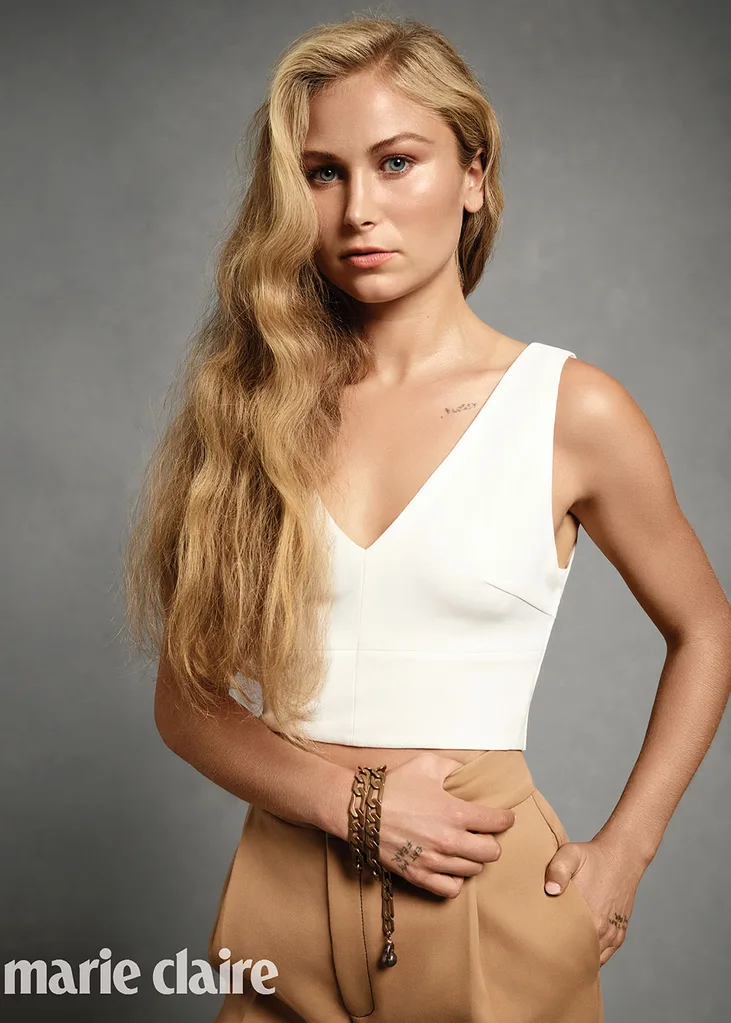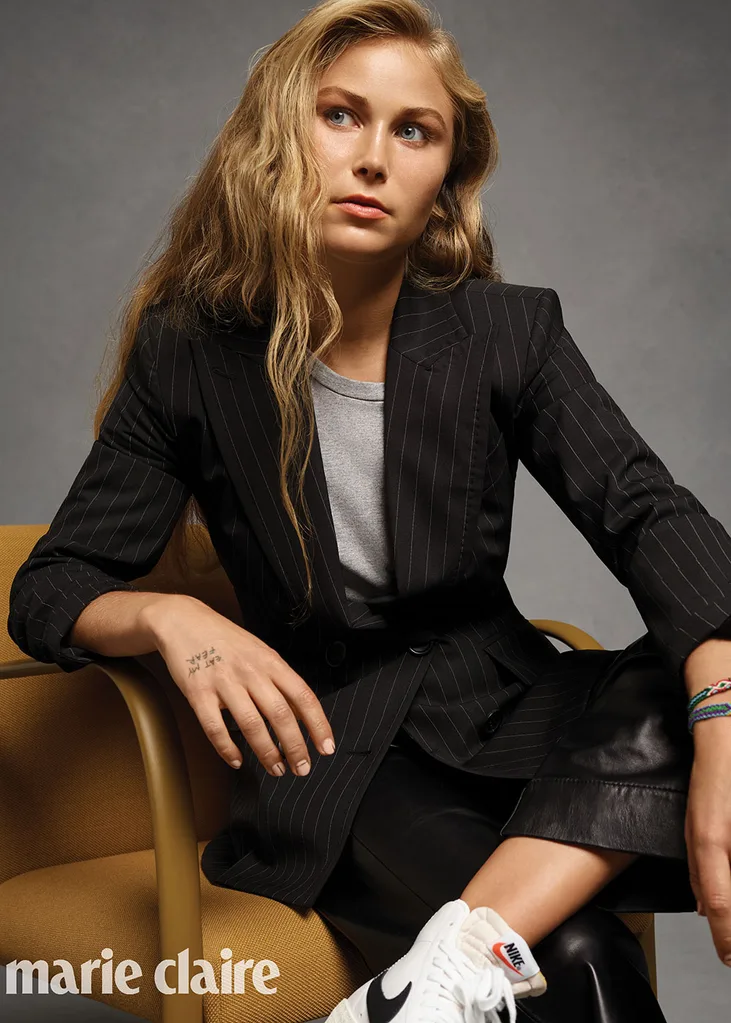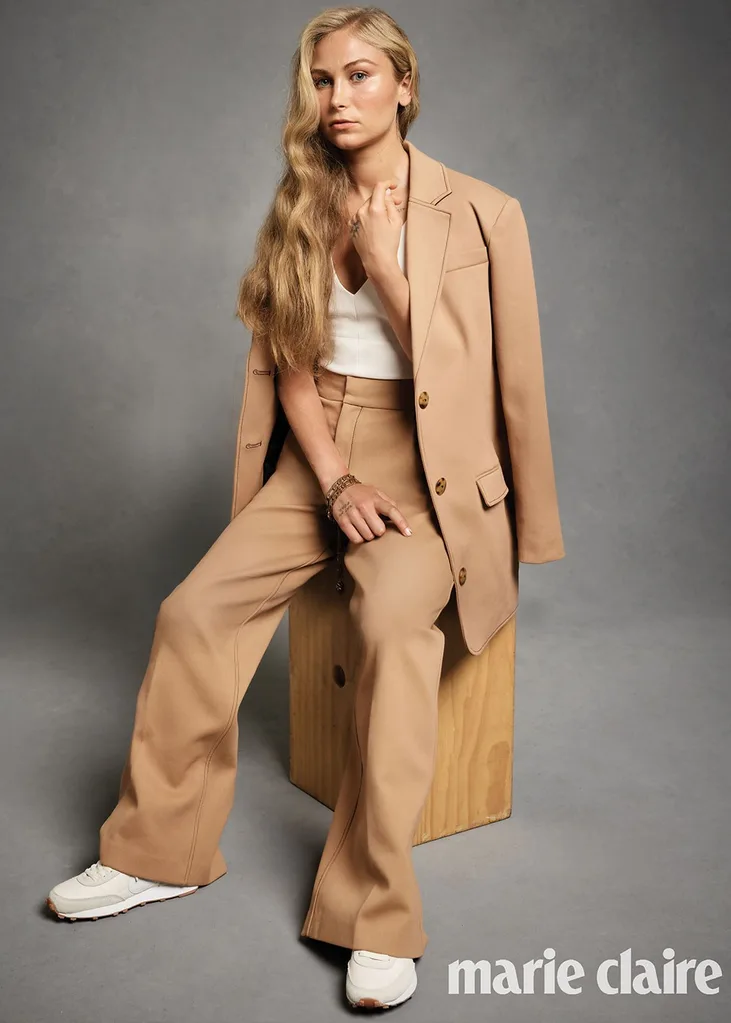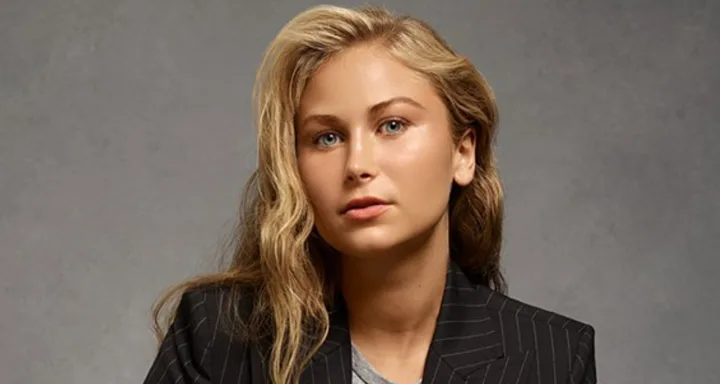Grace Tame will not be defined by darkness. The 26-year-old Tasmanian is a self-described optimist who finds beauty in nature and solace in salty sea swims. Her piercing blue eyes light up when she speaks on issues she’s passionate about, and soften when talk turns to her boyfriend and tight-knit family. She’s a keen runner who won her first marathon last year, and a talented artist who toured the US as comedian John Cleese’s illustrator. And she’s a survivor of child sexual abuse, whose courageous advocacy helped overturn oppressive “victim gag laws” in Tasmania and the Northern Territory, and earned her the title of 2021 Australian of the Year.
“I get frustrated when people only want to focus on the negative details – tell me about your rape; take us back to your darkest moment,” she says as we chat on a rainy Thursday after the marie claire photo shoot. “When there’s all this rage and widespread shock, we can get stuck in a cycle of darkness – and that’s not productive.”
Tame’s mission, rather, is to shed light on the ugly realities of child grooming and sexual abuse – to break through the culture of silence that has allowed corrupt cultures to thrive. “Together we can end child sexual abuse; survivors be proud, our voices are changing history!” she declared in a heart-pounding acceptance speech for her national honour on January 25, as the room erupted into cheers and tears. Since then, she’s become Australia’s woman of the moment, dubbed an “inspiration”, “force for change” and “instigator of a revolution”. In the nine days before we meet she’s given four keynote addresses in three different cities, appeared on two panels, and spoken on television, radio and podcasts – exhausting under any circumstances, let alone when prompted to recount personal trauma. “It’s not always easy to talk about this stuff,” she admits. “But I’m incredibly grateful for the platform. I’m just here as a representative of a community that’s been marginalised and stigmatised for far too long.”
Community has been at the centre of Tame’s cause since she first reported her own abuse. Raped repeatedly as a 15-year-old by her 58-year-old teacher, it was the safety of other young girls that ultimately drove her to speak out, first to another schoolteacher, and then to police. “I knew my abuser had done it to other girls – he’d told me about them,” she says, the disgust in her voice still thick. “I knew that this didn’t start with me, but that I had the potential to end it with me, and to protect his future targets.”

Years later, Tame discovered that an archaic Tasmanian law prevented her from self-identifying as a sexual abuse survivor in the media, and started fighting for a court exemption. Her legal case became the catalyst for the #LetHerSpeak campaign, created by journalist and sexual assault survivor/advocate Nina Funnell ¬ (in partnership with Marque Lawyers and End Rape on Campus Australia). Seventeen brave sexual assault survivors, including Tame, lent their stories to the cause and lobbied for law reform.
In August 2019, Tame won her individual right to be named through the Supreme Court of Tasmania, and in April 2020, the state’s gag law was overturned. It was nearly 10 years to the day since Tame’s trauma and abuse had begun.
Today she is modest – even blunt – about how she found the strength to spearhead the movement, and to speak out on issues once deemed unspeakable. “For me it’s just a no-brainer…. It’s terrifying to do something in the face of evil, but what’s more terrifying is not doing something,” she says. “There’s so much more potential suffering to come from doing nothing.”
Since then, Tame’s tenacity has set off a rippling row of dominoes around the country. Inspired by Tame, former Liberal staffer Brittany Higgins alleged she was raped by a male colleague in Parliament House (four more women have since come forward with allegations against the same man); teenage girls are sharing stories of sexual harassment and assault; and tens of thousands of women and men have marched the streets to demand an end to gendered violence and inequality.
Days before our chat, Tame took the stage at the Women’s March 4 Justice in Hobart, a packed-out rally charged with emotion and hope. “I’ve never seen anything like it,” she says. “I was the last speaker and the crowd went fucking berserk. It was just free-flowing positivity and I felt so much love coursing through me. It was electric; like rocket fuel.” Tame had originally declined the invitation to speak, desperately in need of a day off, but changed her mind last minute: “I thought, this is so important. This issue is bigger than me, it’s bigger than any individual. That’s why we show up.”

Tame grew up on the wind-swept Eastern Shore of Hobart, Tasmania, and speaks affectionately about beach holidays at the Bay of Fires and week-long camping trips with her cousins. “I have a wealthy stock of memories,” she shares. “Nothing grand, simple stuff, really: laughing with my family, playing soccer; adventuring in nature, running around with my best friend Dom. We were thick as thieves at primary school and both of us have since been diagnosed with high-functioning autism, thought we didn’t know it at the time.”
Her family was close and loving, though her parents had split amicably when she was a baby, and living between two homes created some “internal instability”. She thrived academically and was awarded a scholarship to a prestigious private high school, St Michael’s Collegiate Girls’, but felt off-kilter in a new world where appearances and money held high value. “I’m a perfectionist and that, together with my autism and the resurfacing of traumatic memories [Tame was molested by an older child as a six-year-old], manifested in the form of anorexia,” she says. “It got out of control when I was 14 – at about 40 kilos I was hospitalised and put on a feeding tube.”
It was when she returned to school – tiny and fragile – that Nicolaas Bester, a maths and science teacher who had taught Tame the previous year, started to weasel his way into her life. “He identified me as a weak and vulnerable target – that was the first stage of grooming,” she says. This deep psychological abuse that often underpins sexual violence is something Tame has since studied extensively, and can speak about with a frank detachment. “The predator works to gain the target’s trust, fill a gap in their support network, isolate them from their family and friends, gradually sexualise them, and maintain control,” she explains.
“Your mind is instilled with shame and fear and you start to doubt everything. You’re programmed to question trusting anybody else, but you really question yourself and your own judgement. Did I invite this in some way? Am I somehow complicit? Clearly I must have done something wrong, because this person presented as caring, empathetic and supportive, and yet they hurt me, so I must have deserved that hurt.”

Bester raped Tame 20 to 30 times over six months, usually on the floor of his office. He towered over her bone-thin body and recounted her with tales of killing people when he was a soldier, and said he’d lose his job if she told anyone what was going on. On average, it takes survivors of child sexual abuse 24 years to confide in anyone, such is the fear and self-doubt that predators instil in their targets.
The sick and sinister manipulator would inflict pain on the 15-year-old, then provide her with relief from that pain – a behaviour Tame likens to coercive control. “I think where people on the outside go wrong is that they assess it like it’s an 100 per cent negative experience – every day you go home and you’re beaten up, or every day you’re raped, and it’s just an uncut horror,” she says. “It’s not like that. And that actually makes it worse. It’s that unpredictability.”
Bester also stalked Tame, lurking behind her in school corridors and sitting in his car outside her home at night. “When people are being abused they’d actually rather be in the presence of their abuser than not, because it takes away the unpredictability,” explains Tame. “I pose this question: what’s scarier than sharing a room with a spider? And the answer is: knowing that you’re sharing a room with a spider but having no fucking idea where it is. That’s what it’s like. That’s more terrifying.”
Eventually, Tame’s terror exploded into anger and she confronted her abuser. “I remember the last words I said to him,” she says, her tone escalating. “I was spitting rage. I was 16 and I was crying my eyes out. He’d seen the scars on my legs – throughout the abuse I’d turn up and I’d have cuts all up my arms and legs, and he’d still hurt me. He’d seen what a shell of a person I’d become. I said, ‘You’re a monster,’ and he just fucking sat there and looked at me blankly and shrugged. He said, ‘Well if that’s what you think of me.’ There’s no humanity in [him], no humanity. And I tried. That was my last ditch effort. I think subconsciously I wanted to see if I could pry any kind of empathy from this man. And there just wasn’t any there.”
After that, Tame confided in a teacher whom she felt she could trust – “Dr William Simon, he’s awesome. Print his name!” she says. “I’m having dinner with him on Friday.” He set up a meeting with the principal and they filed a police report. In August 2011 Bester was sentenced to two years and six months in jail for the abuse of Tame, and a further four months for the possession of child pornography.

While Tame’s physical abuse was over, the trauma lived on inside her. She moved to California and tried to numb her pain with substances and other forms of self-destruction, but also became a yoga instructor, studied theatre arts and liberal arts, and worked as an illustrator.
There wasn’t one watershed moment that set her on her path to advocacy, though when Tame found out that her abuser had been released from prison after 19 months and was speaking to the media and bragging about her on Facebook, she knew she needed to take back her narrative. Then, in 2015 the convicted paedophile enrolled in a PhD at the University of Tasmania. “He was put into student accommodation with fresh undergraduates!” Tame fumes. “The vice chancellor at the time has now been exposed as a sexual predator. See how it works? They enable each other.”
She pauses. “[My abuser] still lives in Hobart today. I’ve seen him around a few times …” she trails off. “And I’ve been contacted by some of his other victims and spoken to them.” Connecting with fellow survivors – speaking, sharing, crying together – is part of Tame’s ongoing healing, though the sheer volume of messages she receives is also overwhelming. So too is looking out at a crowd of protestors and seeing placards emblazoned with her name: “What Grace Tame said”; “I stand with Grace” and “Eat My Fear” (Tame has the phrase tattooed on the back of her hand.)
“It’s very surreal, I haven’t gotten my head around it,” she shrugs. “Can you get your head around it? But I think it’s less to do with me and more a symbol of progress. When I first reported my abuse, there was shame and stigma directed toward the issue. Today we have people carrying signs [in support].”
Yet despite this mood and momentum – and Tame’s natural gift as an orator – she doesn’t want to see a frenzied uprising. “We’re all getting very stirred up at the moment – and the forces that perpetuate corrupt cultures will be hoping that eventually we get sick of it, put it under the rug and retreat back into silence,” she says. “We see these surges often and then they die down. What we need to do is sustain a more manageable, reasonable momentum that’s not so overblown, it’s just measured.”

As such, Tame is ardent about education on grooming as a primary means of prevention – in schools, workplaces and other institutions – followed by legislative change. “We currently have eight different definitions of sexual consent around the country,” she says. “To me it’s common sense, we need a standard national definition.”
She’s been invited to work with countless politicians (“every man and his dog”), but isn’t interested in pursuing those campaigns or partnerships. “This issue is far too important to be politicised,” she says. “It transcends all divides.” On that note, she’s also adamant that men should not be seen as the enemy, circling back to her saviour teacher, Dr Simon. “Some of my closest survivor friends are middle-aged men who were abused by the clergy,” she adds.
Then there are two other males who have shaped and filled her life with immeasurable joy. One is her boyfriend Max, who she met after moving home to Tasmania last year. “He’s the love of my life, my actual soul mate,” she says. “And I know it sounds trite and soppy, but I couldn’t give less of a fuck about that. Because, yeah, I know what love is now. I’d known it in a platonic way and in a familial way, but not this kind of love. And we’ve both been in long-term relationships before. I was even married [to American actor Spencer Breslin]. But I’m already closer to Max than I was to my husband, and we’ve only been together for five months.”
Her face crumples into a smile when I ask about her younger brother, Oscar, who turns 11 in May. “He’s my little hero,” says Tame. “He’s a very, very special person. He came into the world right when the abuse started, and pardon the pun, but he was a literal saving grace. I didn’t feel like I had very much to live for at that time. I’d attempted suicide during the abuse … His presence saved us all in many ways.”
But Tame has also saved herself. “I’ve learnt that [with] the power of the human spirit, and the power of the collective, you can transcend and overcome anything, and that nothing is fixed,” she says. “You can always redefine yourself. You can always redefine things that happen. I tend not to think of life so much as happening to me or happening to individuals, but just as happening. It doesn’t discriminate.”
In her tenure as Australian of the Year, Tame wants to bring about reform in education and legislation, though she’ll keep fighting the fight long after her reign – until child sexual abuse is eradicated. She hopes to one day start a family with Max, and to just keep living, learning and loving. Her story will not be defined by darkness nor light, but the full spectrum of colours, connections and experiences inbetween.
“Everything comes back to the power of love,” says Tame. “And love’s free. The best things in life are free.”










